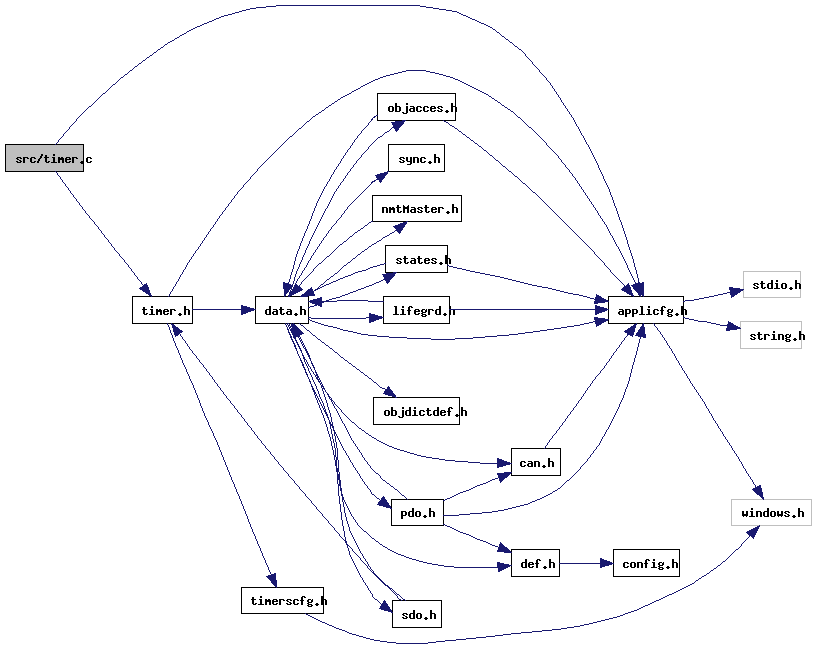
#include <applicfg.h>#include "timer.h"Include dependency graph for timer.c:

Go to the source code of this file.
Defines | |
| #define | min_val(a, b) ((a<b)?a:b) |
Functions | |
| TIMER_HANDLE | SetAlarm (CO_Data *d, UNS32 id, TimerCallback_t callback, TIMEVAL value, TIMEVAL period) |
| TIMER_HANDLE | DelAlarm (TIMER_HANDLE handle) |
| void | TimeDispatch () |
Variables | |
| s_timer_entry | timers [MAX_NB_TIMER] = {{TIMER_FREE, NULL, NULL, 0, 0, 0},} |
| TIMEVAL | total_sleep_time = TIMEVAL_MAX |
| TIMER_HANDLE | last_timer_raw = -1 |
Definition in file timer.c.
| #define min_val | ( | a, | |||
| b | ) | ((a<b)?a:b) |
| TIMER_HANDLE DelAlarm | ( | TIMER_HANDLE | handle | ) |
----- Use this to remove an alarm ----
| handle |
Definition at line 112 of file timer.c.
References last_timer_raw, MSG_WAR, struct_s_timer_entry::state, and timers.
Referenced by _sendPDOevent(), heartbeatStop(), PDOStop(), proceedNODE_GUARD(), proceedPDO(), ProducerHearbeatAlarm(), stopSYNC(), and TPDO_Communication_Parameter_Callback().
| TIMER_HANDLE SetAlarm | ( | CO_Data * | d, | |
| UNS32 | id, | |||
| TimerCallback_t | callback, | |||
| TIMEVAL | value, | |||
| TIMEVAL | period | |||
| ) |
------- Use this to declare a new alarm ------
| d | ||
| id | ||
| callback | ||
| value | ||
| period |
Definition at line 57 of file timer.c.
References struct_s_timer_entry::d, last_timer_raw, MAX_NB_TIMER, TIMER_HANDLE, and timers.
Referenced by _sendPDOevent(), heartbeatInit(), proceedNODE_GUARD(), startSYNC(), and StartTimerLoop().
| void TimeDispatch | ( | void | ) |
------ TimeDispatch is called on each timer expiration ----
Definition at line 131 of file timer.c.
References getElapsedTime(), last_timer_raw, min_val, TIMER_HANDLE, timers, TIMEVAL, TIMEVAL_MAX, and total_sleep_time.
Referenced by class_timers::timer_loop_thread_proc(), timer_notify(), and timerloop_task_proc().
Here is the call graph for this function:

| TIMER_HANDLE last_timer_raw = -1 |
| s_timer_entry timers[MAX_NB_TIMER] = {{TIMER_FREE, NULL, NULL, 0, 0, 0},} |
| TIMEVAL total_sleep_time = TIMEVAL_MAX |
 1.5.1
1.5.1